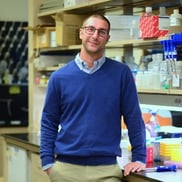Four early career researchers from the University of Colorado Cancer Center have received Institutional Research Grants (IRGs) from the American Cancer Society (ACS) for 2023 through the parent grant awarded to the CU Cancer Center. IRGs are intended to support junior faculty members to obtain preliminary results that will enable them to compete successfully for federal research grants.
In fall 2022, the CU Cancer Center was awarded a competitive renewal of the ACS parent IRG to principal investigators (PIs) Jennifer Richer, PhD, and John Tentler, PhD, who have written and renewed this grant twice since 2017. Each year a CU Cancer Center panel reviews the applications and meets to select that year’s IRG junior faculty recipients. The review committee consists of faculty from the various schools on the CU Anschutz Medical Campus and other Colorado universities doing all types of cancer related research, from prevention and control to development of new treatments and clinical trials. Reviewers, through their written comments, help mentor new investigators in grant-writing skills.
“The goal is to give these investigators seed money for what we call high-risk, high-yield studies — things that maybe the National Institutes of Health would not fund at this point if more preliminary data is needed to support the premise of their hypothesis,” Tentler says. “Then we track these investigators to see if they leverage the ACS IRG seed grants into larger funding, published manuscripts, or clinical trials. For many of our highly successful cancer researchers, this grant jump-started their research programs as their first grant funding.”
The one-year IRG grants are for $40,000 per researcher from the ACS IRG funds. The CU Cancer Center adds an additional $30,000 per year in matching funds to bring the total to $70,000.
“To get substantial data to help obtain federal funding, it’s really nice to have this increased dollar amount,” says Richer, PI of the grant since 2017.
The CU Cancer Center IRG recipients for 2023 are:
New treatments for MDS
 Maria Amaya, MD, PhD, assistant professor of hematology in the CU School of Medicine, is looking to develop therapeutic strategies for patients with myelodysplastic syndrome (MDS).
Maria Amaya, MD, PhD, assistant professor of hematology in the CU School of Medicine, is looking to develop therapeutic strategies for patients with myelodysplastic syndrome (MDS).
“Treatment options are very limited for MDS, with a large unmet need for newer treatments,” Amaya says.
Amaya’s IRG-funded research will examine a mutation in a splicing protein gene called SF3B1 that leads to aberrant alternative splicing and affects a large number of downstream genes. Amaya and her research team will study how the mutation SF3B1 shapes the metabolic dependencies of MDS cells in an effort to discover therapeutic targets.
A drug combination to treat ductal adenocarcinoma
 Robert Lentz, MD, assistant professor in the Division of Medical Oncology, received funding to test the combination of two drugs — selinexor and olaparib — in colorectal and pancreas ductal adenocarcinoma.
Robert Lentz, MD, assistant professor in the Division of Medical Oncology, received funding to test the combination of two drugs — selinexor and olaparib — in colorectal and pancreas ductal adenocarcinoma.
“Metastatic colorectal and pancreas ductal adenocarcinoma are common and deadly and frequently harbor KRAS mutations,” Lentz says. “Novel treatments are desperately needed.”
He hypothesizes that selinexor, a selective inhibitor of nuclear export, and olaparib, a PARP inhibitor, may synergize to generate DNA strand breaks, decrease homologous recombination repair, and restore cytoplasmic/nuclear localization of key tumor suppressor proteins and growth regulators, ultimately resulting in cell cycle arrest and cell death.
Lentz will study the effects of these drugs on patient-derived organoid and patient-derived xenograft models, as well as animal models, with an eye toward using his results to support translation to a clinical trial.
Targeting NLRP3 in pancreatic ductal adenocarcinoma
 Carlo Marchetti, PhD, assistant professor in the Division of Infectious Diseases, is also looking for new treatments for pancreatic ductal adenocarcinoma.
Carlo Marchetti, PhD, assistant professor in the Division of Infectious Diseases, is also looking for new treatments for pancreatic ductal adenocarcinoma.
“Pancreatic ductal adenocarcinoma (PDAC) is one of the most lethal cancers, with a five-year survival rate of only 10%,” Marchetti says. “Due to very limited and only modestly effective therapeutic options, PDAC is projected to become the second leading cause of cancer-related death in the U.S. by 2030.”
Marchetti is looking for ways to target the protein NLRP3, a key driver of PDAC-mediated inflammation that contributes to PDAC growth and inhibits response to therapy. Using animal models, he will investigate whether NLRP3 inhibition limits PDAC progression in vivo.
Examining myeloid-derived suppressor cells in ovarian cancer
 Nicole Marjon, MD, PhD, assistant professor of gynecologic oncology, will use her IRG funds to investigate the role of myeloid-derived suppressor cells in ovarian cancer.
Nicole Marjon, MD, PhD, assistant professor of gynecologic oncology, will use her IRG funds to investigate the role of myeloid-derived suppressor cells in ovarian cancer.
“High-grade serous ovarian cancer (HGSOC) is the deadliest gynecologic malignancy, with a five-year survival rate of less than 50%,” Marjon says. “The efficacy of T cell directed immunotherapy has been disappointing in HGSOC despite durable responses in other cancer types.”
Myeloid derived suppressor cells (MDSCs) — immature myeloid cells that are characterized by the ability to suppress immune responses and expand during cancer, infection, and inflammatory diseases — in the tumor microenvironment are immune-suppressive and are associated with poor prognosis. Marjon hypothesizes that inhibiting MDSC function will allow activation of cytotoxic T-cells and improved response to therapy.



